About 9/11, Patriot II And Freedom In The Air
The following is a transcribed excerpt from "Fox News
Sunday," Aug. 3, 2003.
 Brit Hume
(Moderator): I'm Brit Hume in for Tony Snow, and this is
"Fox News Sunday."
Brit Hume
(Moderator): I'm Brit Hume in for Tony Snow, and this is
"Fox News Sunday."
Good morning from Fox News in Washington. We'll talk with our
guests after a look at the headlines.
A new audio tape, purportedly from Usama bin Laden (search)'s
top deputy, warns the United States not to harm terror detainees at
Guantanamo Bay. Ayman al-Zawahiri (search) says on the tape that
America will pay dearly if the prisoners are hurt and that the US
should expect more attacks.
Meanwhile, the State Department announced it is closing two
loopholes that would have allowed terrorists to elude checkpoints
and to gain access to flights in the United States. The
just-suspended program gave foreign travelers without visas the
option to change planes in American airports.
On Wednesday, President Bush cited fresh intelligence that
indicated Al Qaeda operatives may be planning new terror attacks.
The president, though, expressed confidence that any attempts would
be thwarted.
In our latest Fox News/Opinion Dynamics poll, an overwhelming
majority believed Al Qaeda operatives are in the US Meanwhile, 57
percent think the government is not doing enough to secure the
country's borders.
On a second front, the Patriot Act, although permitting the
government wider authority to use wiretaps and other means of
surveillance, is thought to be a good thing by a clear majority
surveyed in our poll, though it has come under bipartisan attacks
in Congress.
Here to cover these topics and more is Attorney General John
Ashcroft.
Good morning, welcome to you, sir.
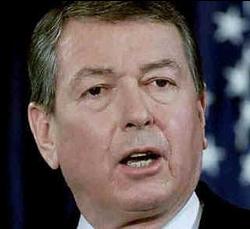 Ashcroft:
Glad to be with you.
Ashcroft:
Glad to be with you.
Hume: First of all, let's deal with these Al
Qaeda threats that have been cited this week. I guess there's a
continuing issue of sleeper cells and then the threat that the
president was talking to had to do with, again, the use of
jetliners. What do you know about the state of those threats?
Ashcroft: Well, first of all, we believe that
Al Qaeda continues to exist; that it continues to aspire to do
great injury ...
Hume: Exist in this country?
Ashcroft: We believe that Al Qaeda associates
are involved in America. I think the American people understand
that we're always conscious of the potential presence and activity
of individuals who would hurt us from within the country. It's not
just individuals who might transit the country, although we believe
that that is also a threat.
Hume: What about the transiting threat? I
assume that's what the president was being asked about and was
talking about. What is that? What has been done about it? Where
does it stand?
Ashcroft: Well, it -- for a long time,
individuals who were on through-flights -- a flight that would land
in the United States -- say, it would come from Western Europe,
land in the United States, then take off again, perhaps for a South
American destination -- now, that person, in many respects, wasn't
required to have a visa for the United States ...
Hume: Right.
Ashcroft: ... because he was just on the ground
while the plane landed, carried from one gate to another, under
some kind of supervision, and then leaving the country.

It's understood that that could be a threatening circumstance.
For instance, if an individual, upon the takeoff of the plane from
the United States to the destination in another setting, would
command the plane and divert it, it could have the same kind of
impact as you had in the disastrous 9/11 circumstance.
So, additional steps have been taken to curtail the potential
that something like that would take place.
Hume: And that's what the State Department, I
presume, did with the visa issue.
Ashcroft: It was called transit without visa.
You could go through the United States, a limited time frame, under
certain guarded and restricted circumstances, and then go on.
But it's been abandoned, in some measure, because we believe
that the security threat, obviously, is one which merits taking
that potential out of the equation.
Hume: Well, do you now believe that that
particular threat, then, has been, if not eliminated, greatly
diminished?
Ashcroft: Well, we believe it's been
diminished. We wouldn't take the step if we didn't think it
diminishes the threat.
I believe air travel is safe. My family and I are going to be
traveling during the month of August on commercial aviation. We
expect to be safe in doing so.
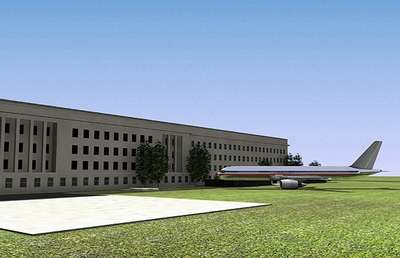
But the fact that the president raised this and the potential of
a focus by Al Qaeda on air travel indicates that we're going to
take special care to make sure that it's as safe as it can possibly
be.
Hume: Let me take you back to Al Qaeda. How
extensive is the Al Qaeda penetration in this country and -- with
sleeper cells or whatever other assets you believe they may
have?
Ashcroft: Well, we continue to find individuals
who have associations to Al Qaeda and Al Qaeda leadership. And one
individual, Iman Faris (ph), who was discovered in Ohio just this
spring, was an example, that he has pled in regard to certain
activities here.
Hume: What did you find out from him?
Ashcroft: Well, we just found out that he had
agreed to surveil follow-on targets, and to be involved in other
potential attacks, or at least to do preliminary work that would
relate to the potential of follow-on attacks. Other individuals in
that same category of circumstances have been detained or
disrupted, and we're going to continue to do that.
And the alleged statement -- we haven't authenticated it -- by
Zawahiri, this morning signals that at least of that's a ...
Hume: What's new in that?
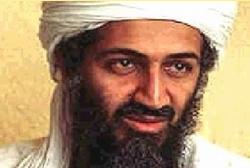 Ashcroft: Well,
there's an irony in this statement. He says, "If you would harm
anybody in Al Qaeda, we will do great damage to the United States."
Well, it's a little bit ironic to say that they would wait until we
did something to one of them before they would do damage to the
United States.
Ashcroft: Well,
there's an irony in this statement. He says, "If you would harm
anybody in Al Qaeda, we will do great damage to the United States."
Well, it's a little bit ironic to say that they would wait until we
did something to one of them before they would do damage to the
United States.
They did great damage to the United States on 9/11: 3,000 people
destroyed, lives destroyed all across the United States as a result
of the attacks on New York and on Washington and, of course, the
plane attack in -- the plane that went down in Pennsylvania.
The point is, there was a more or less veiled threat here that
if the adjudication of prisoner and war crimes as a result of the
detainees were not in some way modified, that they would strike
us.
I believe Al Qaeda wants to strike us. I believe they want to
strike us whenever and wherever they can. I believe we've disrupted
dozens and dozens and dozens -- over 100 terrorist-related attacks
around the world since 9/11.
And so perhaps there's not a whole lot that's new. It reveals
the hypocrisy of an organization that says if, you know, "that
military tribunal may not be a good enough adjudicative measure,
and therefore if you have ..."
Hume: "We're going to do to you what we're
going to do to you anyway."
Ashcroft: Yes, more or less.
Hume: Nonetheless, despite all the efforts
you've made, should the American people expect and believe, and do
you believe, that we're going to get hit again?
Ashcroft: Well, I believe that the potential
for us to be hit again is a very real potential. And the kinds of
efforts that we're making, the kinds of information we're sharing
with the American people, signal that we believe that there is such
a potential, but that we minimize the potential whenever we're
alert.
The reason for giving an alert is that you're saying to people,
"If we are alert, and if we take the right steps, we drive down the
risk." And acting as if there is no risk elevates the risk.
Hume: Well, there's been a lot of talk this
week: sleeper cells, Al Qaeda, the president mentioning it. Is
there any contemplation being given now to raising the terrorist
threat level?
Ashcroft: Well, there really is an elevated
awareness on the part of the American people.
Hume: Well, that's the name of it right now,
elevated, right? But, I mean, he's thinking about notching it up
one more time?
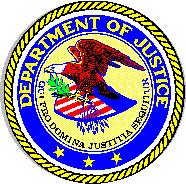 Ashcroft:
Those -- what I want to say is that because the nature of the
intelligence seemed to be focused, rather than have an increased
risk level generally, information was shared with the American
people related to the specificity of the risks that appeared to be
more redundant, more repetitive in the intelligence community, and
more corroborated.
Ashcroft:
Those -- what I want to say is that because the nature of the
intelligence seemed to be focused, rather than have an increased
risk level generally, information was shared with the American
people related to the specificity of the risks that appeared to be
more redundant, more repetitive in the intelligence community, and
more corroborated.
And it's with that in mind that this is not a generally higher
risk category, but as it related to a specific area, primarily
international air travel, the transit-without-visa-type stops in
the United States, et cetera, we thought we'd better do what we
could to minimize that risk by elevating the level of alert in that
...
Hume: Narrow area?
Ashcroft: ... narrow area.
Hume: All right, now, let's talk a little bit
about the Patriot Act, which, while as our poll -- we said it
earlier -- indicates, enjoys considerable public support, you had
the ACLU filing a lawsuit, as the ACLU will do.
Ashcroft: What?
Hume: You had a measure in Congress pass the
House by a considerable margin, 309 to 118, to cut off the funding
for an element of the Patriot Act.
Ashcroft: Let me clarify that just a minute.
The so-called Otter amendment cuts off funding for an ability to
conduct a search and delay notifying the parties searched.
Hume: This is the so-called sneak-and-peek
provision, correct?
Ashcroft: It's called a delayed
notification.
See, this has been available in the law prior to the Patriot
Act. It's really not a part of just Patriot, this is a part of our
law enforcement, been there for long years. It's been something we
use frequently in narcotics investigations.
Hume: So why did they need it in the Patriot
Act?
Ashcroft: Well, for the same reason.
I'll give you an example in narcotics. Last week we -- the
Zambada Garcia (ph) case, we had 230 arrests in a major drug
bust.
Hume: Right.
 Ashcroft:
Well, we couldn't have arrested all 230 if there was a lot of
publicity about the first item that we did. We needed to stage the
arrests and stage the operations so that we could make all of the
arrests.
Ashcroft:
Well, we couldn't have arrested all 230 if there was a lot of
publicity about the first item that we did. We needed to stage the
arrests and stage the operations so that we could make all of the
arrests.
Sometimes it's necessary to do that in the area of
terrorism.
It's important to note that a delayed notification is always
done under the supervision of a federal judge. And what the Patriot
Act did was not to invent this as a technique, or not even to make
it available for the first time in cases that might relate to
terror. It simply said that there are little differences in the
rules around the country, and they should be made uniform.
Hume: Because of the differing opinions from
circuit judges, circuit courts and put on appeals ...
Ashcroft: Absolutely. You're right on target.
The different circuit courts of appeals.
And oddly enough, the codification of the delayed notification
that was included in the Patriot Act comes from the 9th Circuit,
which is perhaps the most liberal circuit in the United States.
So there is misinformation, misunderstanding about the Patriot
Act. The American people get it pretty well. They know that you
can't tell the entire conspiracy about the fact that you're going
to do one little thing here without missing a chance to wrap up a
bigger picture.
Hume: But that was a pretty overwhelming vote
in the House to cut off funding for the use of that. Are you
concerned that it might sail through the Senate? Will the president
veto? Are you recommending a veto or what?
Ashcroft: I certainly don't believe it will
sail through the Senate. I think the Senate understands it very
well.
You know the Patriot Act was passed 98 to 1 in the Senate. It
was passed about a 5-to-1 margin -- 5.4-to-1 my people tell me --
in the House. Senator Edwards has indicated that it was the kind of
thing that needed to get the barriers down. Joe Biden said it was
crazy to have authorities that you could use against organized
crime and drug dealers that you couldn't use against
terrorists.
And when it all comes down, I believe not only will they want to
sustain the Patriot Act, but we'll probably need to add some more
tools in our tool kit against terror, which already exists against
drugs and health care fraud.
Hume: Which tools would they be in follow-on
legislation, the Patriot Act II, as it might be called? What do you
...
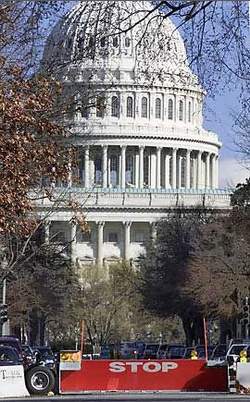 Ashcroft: Well,
I wouldn't call it Patriot Act II, but I would just say this: There
are, for example, 330 areas, like health care fraud or things like
that, nursing home fraud, where you can demand records on the basis
of an administrative subpoena from administrative agencies in the
United States.
Ashcroft: Well,
I wouldn't call it Patriot Act II, but I would just say this: There
are, for example, 330 areas, like health care fraud or things like
that, nursing home fraud, where you can demand records on the basis
of an administrative subpoena from administrative agencies in the
United States.
Hume: No judge?
Ashcroft: You don't have to go before a judge
to do it. These are not necessarily -- these are business
records.
Hume: These are regulated areas, though.
Ashcroft: Yes.
Hume: You're talking about doing this under
regulatory power, correct?
Ashcroft: In some of those areas. In others,
circumstances vary.
It seems to me that anti-terrorism is not below the 330th
priority in our culture, that some -- let me give you an
example.
Shortly after -- in the hours after 9/11 we wanted to get some
business records from a hotel to find out whether people had stayed
there. This is not something protected by the privacy laws or it's
not going into someone's home, it's a business record; the Supreme
Court has said there's no expectation of privacy.
Hume: And?
Ashcroft: And we weren't able to do it without
convening a grand jury and getting a grand jury subpoena. Whereas
an administrative subpoena would provide a basis for getting that
done.
Hume: So what else would you be thinking about
including?
Ashcroft: Well, there are a wide variety of
things.
Hume: Well ...
Ashcroft: Let me give you an example. A serious
drug criminal is presumed to be detained while his trial is going
on or pending trial. A terrorist, there is no presumption of
detention.
Now very frankly, it's a bad thing if there are more drug
dealers on the street. And I think they should be detained if
they're involved in serious drug trafficking. If those are the
charges, they ought to be detained pending adjudication.
But I think it's very serious to think that we don't presume the
detention of individuals whose intent it is to kill as many
Americans as is possible or is to destroy the culture.
Hume: Let me ask you about a particular case
that I think has troubled some people: Jose Padilla. An American
citizen, captured on American soil, held now for however many
months it's been, unable to talk to lawyers. And a lot of people
look at that and say, "If I'm an American citizen, that shouldn't
happen to me."
What do you say to that?
Ashcroft: Well, first of all, he's not held in
the judicial system. He's held as an enemy combatant. And he was
...
Hume: I understand that, but, I mean, someone
could -- presumably someone less scrupulous than I'm sure you feel
this administration is being could pick me up and hold me as an
enemy combatant, could he not?
Ashcroft: Well, I don't think there's any basis
for doing that. I ...
Hume: Well, I understand that, but, I mean, who
would decide? There would be no judge involved, there's no review
here. It seems like a very -- a power that would be subject to
abuse. Wouldn't you agree?
 Ashcroft: Well,
the law on enemy combatants includes a petition for habeas corpus,
but the -- and the court in the Kerran (ph) case indicated that it
would entertain habeas corpus jurisdiction to determine if there
was any basis upon which the claim could be made for enemy
combatant status.
Ashcroft: Well,
the law on enemy combatants includes a petition for habeas corpus,
but the -- and the court in the Kerran (ph) case indicated that it
would entertain habeas corpus jurisdiction to determine if there
was any basis upon which the claim could be made for enemy
combatant status.
This has happened in less than a handful of people. I think
there are three individuals who have been detained in the United
States as enemy combatants, and they weren't necessarily
apprehended in the United States.
This is really the business of deciding, if someone is fighting
against you, do you have the right to detain them as part of the
military operation to resist the fight?
When a person is detained as an enemy combatant, that's similar
to being detained as a prisoner of war. And if you happen to be
fighting on the United States' soil against the United States, you
shouldn't have any more significant rights than if you're fighting
against the United States in Afghanistan or somewhere else.
Hume: When will we -- when may we see the
introduction or request in Congress for amendments to strengthen,
in your view, the Patriot Act?
Ashcroft: Well, I think there are already, in
the Congress, people who are filing measures.
Hume: Will you be presenting something from the
department? I mean, from the administration?
Ashcroft: We are considering a variety of
measures. And those measures, I think, obviously, to be helpful to
us, would have to be available to the Congress in the near
term....
 ANN's Daily Aero-Term (12.14.25): Local Airport Advisory (LAA)
ANN's Daily Aero-Term (12.14.25): Local Airport Advisory (LAA) Airborne 12.08.25: Samaritans Purse Hijack, FAA Med Relief, China Rocket Fail
Airborne 12.08.25: Samaritans Purse Hijack, FAA Med Relief, China Rocket Fail ANN's Daily Aero-Linx (12.15.25)
ANN's Daily Aero-Linx (12.15.25) Airborne 12.10.25: New Gulfstream, ATC Integrator, Outrageous FFZ User Fees
Airborne 12.10.25: New Gulfstream, ATC Integrator, Outrageous FFZ User Fees Airborne-NextGen 12.09.25: Amazon Crash, China Rocket Accident, UAV Black Hawk
Airborne-NextGen 12.09.25: Amazon Crash, China Rocket Accident, UAV Black Hawk











